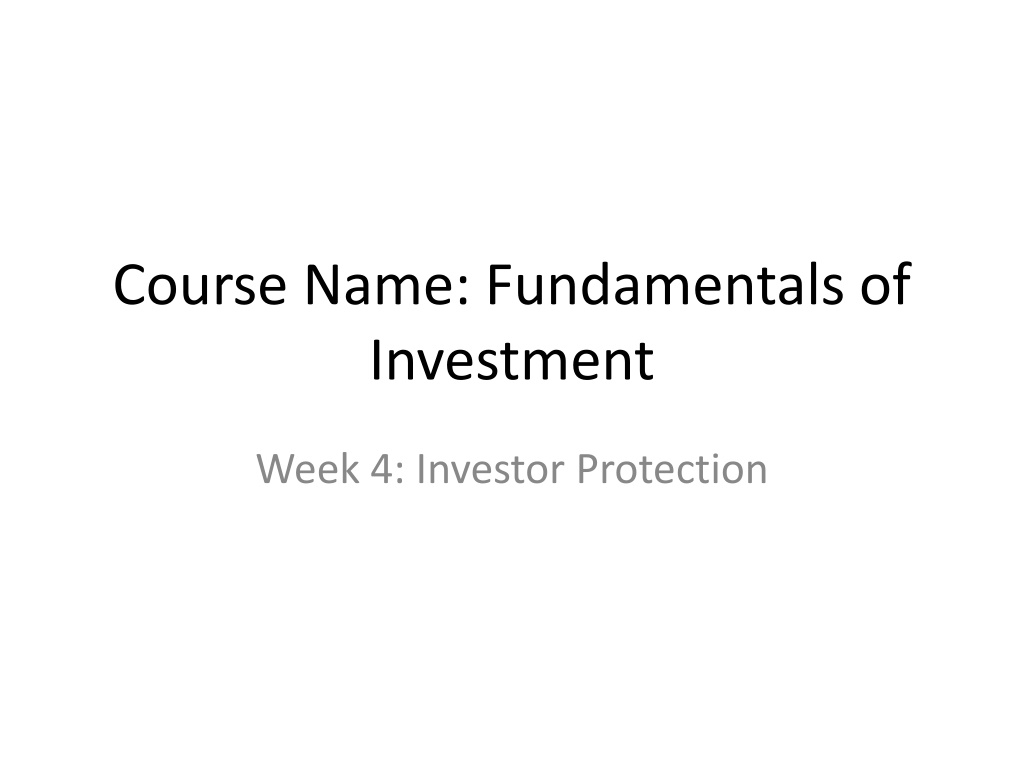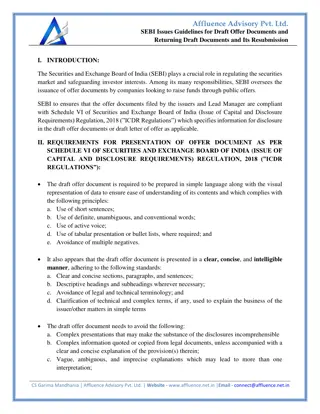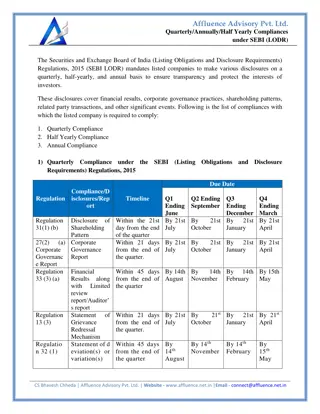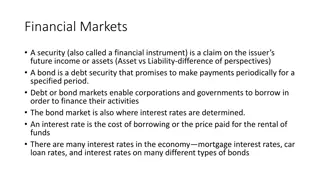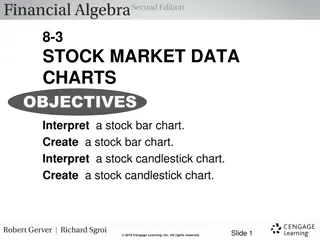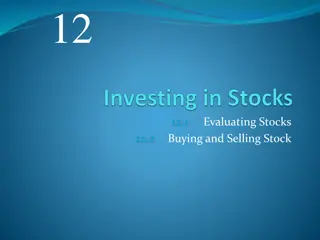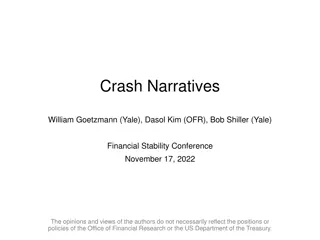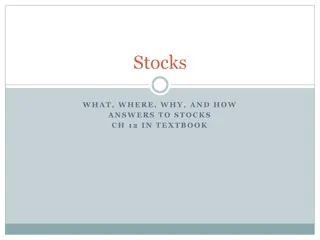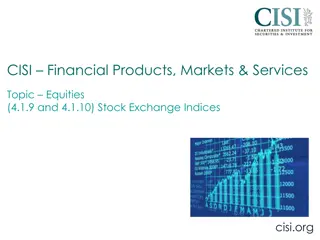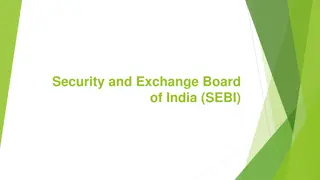SEBI's Role in Investor Protection and Stock Market Regulation
Securities and Exchange Board of India (SEBI) plays a crucial role in safeguarding investor interests and ensuring fair practices in the Indian stock market. By promoting transparency, enforcing regulations, and regulating market intermediaries, SEBI aims to maintain market integrity, protect investors, and foster market growth. Its functions include regulatory oversight, investor protection, market development, regulating intermediaries, and enforcement of regulations.
Download Presentation

Please find below an Image/Link to download the presentation.
The content on the website is provided AS IS for your information and personal use only. It may not be sold, licensed, or shared on other websites without obtaining consent from the author. Download presentation by click this link. If you encounter any issues during the download, it is possible that the publisher has removed the file from their server.
E N D
Presentation Transcript
Course Name: Fundamentals of Investment Week 4: Investor Protection
Week 4: Learning Objectives The objective is to make the learners aware about the protection of investors interests. Another objective is to discuss about the role of SEBI and Stock Exchanges in investor protection. Important topics like Insider trading and investor activism will also be shared in detail.
SEBI SEBI stands for the Securities and Exchange Board of India. It's the regulatory body in India that oversees the functioning of securities markets, ensuring fairness, transparency, and investor protection within the financial realm. This organization regulates stock exchanges, brokers, and other participants in the Indian securities market. Its primary aim is to create a conducive environment for investors and ensure the healthy growth of the securities market in India. B.Com (H) VI Semester Fundamentals of Investment
Role of SEBI in Stock Market SEBI, the Securities and Exchange Board of India, plays a crucial role in regulating and overseeing the Indian stock market. Its key functions include: 1. **Regulatory Oversight:** SEBI sets guidelines and regulations to ensure fair and transparent practices in the securities market. It monitors entities like stock exchanges, brokers, and other intermediaries to maintain market integrity. 2. **Investor Protection:** It safeguards the interests of investors by promoting transparency, ensuring disclosures, and preventing fraudulent activities in the market. SEBI also educates investors about their rights and responsibilities. 3. **Market Development:** SEBI works on initiatives to foster the growth and development of the securities market. It introduces new products, reforms, and policies to enhance market efficiency and liquidity. 4. **Regulating Intermediaries:** SEBI regulates various market intermediaries like stockbrokers, merchant bankers, mutual funds, and credit rating agencies. It establishes rules to govern their conduct and operations. 5. **Enforcement of Regulations:** SEBI has the authority to investigate and take action against any entity or individual violating securities laws. It imposes penalties or other disciplinary measures to ensure compliance. Overall, SEBI's role is pivotal in maintaining the integrity and stability of the Indian stock market, fostering investor confidence, and facilitating its growth while ensuring fair practices and protecting investor interests. B.Com (H) VI Semester Fundamentals of Investment
Investor Protection and SEBI The Preamble of the Securities and Exchange Board of India describes the basic functions of the Securities and Exchange Board of India as ...to protect the interests of investors in securities and to promote the development of, and to regulate the securities market and for matters connected therewith or incidental thereto. SEBI ensures investor protection in the Indian securities market: 1. **Promoting Transparency:** SEBI mandates companies to disclose accurate and timely information to the public. This includes financial statements, corporate governance practices, shareholding patterns, and material events that might affect stock prices. By ensuring transparency, investors can make informed decisions based on reliable information. 2. **Disclosure Requirements:** SEBI sets strict disclosure norms for companies issuing securities. This ensures that investors have access to all relevant information before investing. For instance, before an initial public offering (IPO), companies must disclose their financials, business model, risk factors, and utilization of funds raised through the IPO. 3. **Preventing Fraudulent Activities:** SEBI takes stringent measures to prevent fraudulent activities in the securities market. It monitors market participants to detect and deter activities like insider trading, market manipulation, and fraudulent practices by companies or intermediaries. This helps in maintaining market integrity and protects investors from deceitful schemes. B.Com (H) VI Semester Fundamentals of Investment
4. Investor Education: SEBI focuses on educating investors about the stock market, investment products, and associated risks. It conducts awareness programs, publishes informative materials, and regulates market intermediaries to ensure they provide suitable advice to investors. Educated investors are better equipped to make sound investment decisions and safeguard their interests. 5. Regulating Intermediaries: SEBI oversees various intermediaries like stockbrokers, mutual funds, and investment advisors. It sets standards and rules for their conduct, ensuring they act in the best interests of investors. This includes guidelines on fair practices, due diligence, and disclosure of conflicts of interest. By enforcing these measures, SEBI aims to create a fair, transparent, and secure environment for investors in the Indian securities market. This helps in building trust among investors, encouraging participation, and ultimately contributing to the growth and stability of the market. B.Com (H) VI Semester Fundamentals of Investment
Role of Indian Stock Exchanges with respect to Investor Protection Indian stock exchanges, such as the Bombay Stock Exchange (BSE) and the National Stock Exchange (NSE), play a vital role in ensuring investor protection alongside regulatory bodies like SEBI. Here's how they contribute: 1. **Listing Requirements:** Stock exchanges have stringent criteria for companies to list their securities. These requirements ensure that listed companies meet specific standards of corporate governance, financial reporting, and transparency. This protects investors by offering them access to companies that adhere to certain benchmarks. 2. **Continuous Monitoring:** Exchanges monitor listed companies' compliance with ongoing disclosure requirements. They ensure that companies provide timely and accurate information about their financial performance, corporate actions, and any material developments that might affect investor decisions. 3. **Surveillance and Market Integrity:** Stock exchanges conduct surveillance activities to detect and deter market manipulation, insider trading, and other fraudulent activities. By monitoring trading patterns and unusual market behaviors, exchanges contribute to maintaining market integrity, thereby protecting investor interests. B.Com (H) VI Semester Fundamentals of Investment
4. **Trading and Settlement Mechanisms:** Exchanges provide robust trading platforms and efficient settlement systems. These mechanisms ensure fair and transparent trading practices, minimizing risks associated with transactions. Investors benefit from reliable and secure platforms for buying and selling securities. 5. **Investor Awareness Programs:** Stock exchanges often organize investor awareness programs, workshops, and seminars to educate investors about market dynamics, investment products, and risk management. These initiatives empower investors to make informed decisions and protect themselves from potential risks. 6. **Regulatory Compliance:** Exchanges work in tandem with regulatory authorities like SEBI to ensure that listed companies, brokers, and other market participants comply with regulatory guidelines. They assist in implementing and enforcing regulations aimed at safeguarding investor interests. Overall, Indian stock exchanges act as pivotal intermediaries in the securities market, facilitating fair and transparent trading while actively contributing to investor protection through stringent listing requirements, continuous monitoring, surveillance activities, investor education, and compliance with regulatory measures. B.Com (H) VI Semester Fundamentals of Investment
Investor Grievances An investor grievance refers to a complaint or dissatisfaction raised by an investor regarding a financial transaction, investment product, or any aspect of dealings within the financial markets. These grievances can stem from various issues such as: 1. **Misrepresentation or Mis-selling:** When an investment product is misrepresented or sold to an investor without disclosing its risks or suitability. 2. **Non-receipt of Funds or Securities:** Instances where an investor doesn t receive the funds or securities due to them after a transaction or maturity. 3. **Delay in Services:** Complaints arising from delays in execution, settlement, or processing of transactions by brokers or financial institutions. 4. **Unauthorized Transactions:** Cases where transactions are conducted without the investor's consent or knowledge. 5. **Quality of Services:** Grievances related to the quality of services provided by intermediaries, including customer service issues or discrepancies in account handling. 6. **Non-adherence to Regulations:** Concerns regarding the violation of regulatory norms or guidelines by market intermediaries. Investor grievances are typically addressed through formal channels provided by regulatory bodies or dispute resolution mechanisms established by stock exchanges or regulatory authorities. These mechanisms aim to resolve complaints fairly, ensuring that investors' concerns are heard, investigated, and addressed appropriately. Resolving grievances promptly and effectively is crucial for maintaining investor confidence and trust in the financial markets. B.Com (H) VI Semester Fundamentals of Investment
Role of SEBI to ensure Investor Protection SEBI has given out various methods and measures to ensure the investor protection from time to time. It has published various directives, driven many investor awareness programmes, set up investor protection Fund (IPF) to compensate the investors. SEBI constructs the limit of financial backers through instruction and attention to empower a financial backer to take educated choices. SEBI tries to guarantee that the financial backer gets the hang of contributing. Thus, SEBI ensures that the investor gets and utilizes data needed for contributing and assesses different speculation alternatives to suit his particular objectives. It helps the investor find out his privileges and commitments in a specific venture, bargains through enlisted mediators, plays it safe, looks for help if there should be an occurrence of any complaint, and so on. SEBI has been putting together financial backer schooling and mindfulness workshops through financial backer affiliations and market members, and has been urging market members to sort out comparable projects. It keeps a refreshed, far reaching site for training of financial backers. It distributes different sorts of alerts through media. It reacts to the questions of financial backers through phone, messages, letters, and face to face for the individuals who visit SEBI office. B.Com (H) VI Semester Fundamentals of Investment
SEBI makes everything of interest accessible in public domain. SEBI has received revelation based administrative system. Under this structure, backers and go-betweens unveil applicable insights concerning themselves, the items, the market and the guidelines so the financial backer can take educated venture choices dependent on such divulgences. SEBI has endorsed and screens different introductory and persistent exposures. SEBI guarantees that the market has frameworks and practices which make exchanges safe. SEBI has taken different estimates, for example, screen based exchanging framework, dematerialization of protections and outlined different guidelines to direct delegates. It has also issued an exchange of protections, corporate rebuilding, etc. to ensure the interests of financial backers in protections. It additionally guarantees that only legitimate people are permitted to work on the lookout, each member has motivation to agree with the recommended principles, and the defaulters are granted praiseworthy discipline. Lastly, SEBI encourages a redressal of financial backer complaints. SEBI has a far-reaching system to encourage redressal of financial backer complaints against middle people and recorded organizations. It circles back to the organizations and middle people who don't change financial backers' complaints, by sending suggestions to them and having gatherings with them. It makes proper implementation moves as given under the law (counting dispatch of settling, indictment procedures, bearings) where progress in redressal of financial backer complaints isn't good. It has set up a complete mediation instrument in stock trades and vaults for goal debates of the financial backers. The stock trades have financial backer security assets to remunerate financial backers when a dealer is pronounced a defaulter. Store repays financial backers for misfortune because of carelessness of storehouse or safe member. B.Com (H) VI Semester Fundamentals of Investment
SCORES Initiative - SEBI Centralised database of investor complaints Online movement of complaints to the concerned listed company or SEBI registered intermediary Online upload of Action Taken Reports (ATRs) by the concerned listed company or SEBI registered intermediary Online viewing by investors of actions taken on the complaint and its current status SCORES is web enabled and provides online access 24 x7; Complaints and reminders thereon can be lodged online at the above website at anytime from anywhere; An email is generated instantaneously acknowledging the receipt of complaint and allotting a unique complaint registration number to the complainant for future reference and tracking; The complaint forwarded online to the entity concerned for its redressal; www.scores.gov.in The salient features of SCORES are: B.Com (H) VI Semester Fundamentals of Investment
Procedure for SCORES B.Com (H) VI Semester Fundamentals of Investment
Insider Trading SEBI (PROHIBITION OF INSIDER TRADING) REGULATIONS, 2015 Definition of Insider "insider" means any person who is: i) a connected person; or ii) in possession of or having access to unpublished price sensitive information; B.Com (H) VI Semester Fundamentals of Investment
Unpublished Price Sensitive Information" (UPSI) means any information, relating to a company or its securities, directly or indirectly, that is not generally available which upon becoming generally available, is likely to materially affect the price of the securities and shall, ordinarily including but not restricted to, information relating to the following: (i) financial results; (ii) dividends; (iii) change in capital structure; (iv) mergers, de-mergers, acquisitions, delistings, disposals and expansion of business and such other transactions; (v) changes in key managerial personnel. B.Com (H) VI Semester Fundamentals of Investment
Communication or procurement of unpublished price sensitive information (Regulation 3) No insider shall communicate, provide, or allow access to any unpublished price sensitive information, relating to a company or securities listed or proposed to be listed, to any person including other insiders except where such communication is in furtherance of legitimate purposes, performance of duties or discharge of legal obligations. Trading Plans (Regulation 5) An insider shall be entitled to formulate a trading plan and present it to the compliance officer (CS) for approval and public disclosure pursuant to which trades may be carried out on his behalf in accordance with such plan. B.Com (H) VI Semester Fundamentals of Investment
SEBI Act, 1992 and Penal Provisions for Insider Trading (Section 15G) B.Com (H) VI Semester Fundamentals of Investment
Vigil Mechanism and Whistle Blowing A whistleblower is defined as an employee who reports an activity that the employee considers to be illegal or dishonest to one or more of the stakeholders of the company. The whistleblower is not responsible for investigating the activity or for determining fault or corrective measures; appropriate management officials are charged with these responsibilities. In India, SEBI mandates that the listed company shall have a whistle-blower policy and make employees aware of such policy to enable employees to report instances of leak of unpublished price sensitive information. Section 177(9) of the Companies Act, 2013 provides that every listed company Companies which accept deposits from the public; Companies which have borrowed money from banks and public financial institutions in excess of Rs. 50 Crores shall establish a vigil mechanism for Directors and employees to report genuine concerns in such manner as may be prescribed. Section 177(10) provides that the vigil mechanism under sub-section (9) shall provide for adequate safeguards against victimisation of persons who use such mechanism and make provision for direct access to the chairperson of the Audit Committee in appropriate or exceptional cases. B.Com (H) VI Semester Fundamentals of Investment
Investors Awareness and Activism. Investor awareness and activism are crucial elements in safeguarding investors' interests and ensuring a fair and transparent financial market. Here's what each entails: 1. **Investor Awareness:** This involves educating investors about financial markets, investment products, risks involved, and their rights and responsibilities. It includes initiatives such as workshops, seminars, educational campaigns, and informative materials aimed at empowering investors to make informed decisions. Greater awareness helps investors navigate the complexities of the market, understand potential risks, and make prudent investment choices. 2. **Activism:** Investor activism refers to the proactive involvement of investors in corporate governance matters and market-related issues. It involves shareholders exercising their rights to influence companies' decisions, policies, or practices. Activism can take various forms, such as voting on corporate matters, engaging in shareholder resolutions, advocating for changes in company practices, or collaborating with other investors to address common concerns. B.Com (H) VI Semester Fundamentals of Investment
In the Indian stock market, investor activism has been gradually gaining prominence as shareholders and other stakeholders become more aware of their rights and the impact they can have on companies. Here's how investor activism manifests in the Indian context: 1. **Proxy Voting and Shareholder Resolutions:** Shareholders exercise their voting rights during company annual general meetings (AGMs) to influence key decisions. They may propose resolutions on issues such as corporate governance reforms, executive compensation, board composition, or environmental and social policies. 2. **Engagement with Company Management:** Institutional investors and activist shareholders engage directly with company management to discuss concerns, advocate for changes, or seek clarification on strategic decisions. These engagements could involve dialogues on governance practices, capital allocation, or business strategies. 3. **Corporate Governance Advocacy:** Investor activism often focuses on improving corporate governance standards. Activists push for greater transparency, better board oversight, independent director appointments, and adherence to ethical business practices. B.Com (H) VI Semester Fundamentals of Investment
4. **Environmental, Social, and Governance (ESG) Concerns:** Investors increasingly advocate for companies to adopt ESG practices. They might raise concerns about environmental impact, social responsibility, or ethical behavior and urge companies to integrate these considerations into their operations. 5. **Class Action Lawsuits and Legal Action:** In cases of perceived misconduct or corporate wrongdoing, investors might resort to legal action, including class action lawsuits, to seek redressal for violations of securities laws or breaches of fiduciary duties by company management. 6. **Activist Funds and Institutional Investors:** Some institutional investors and activist funds take substantial stakes in companies with the aim of effecting change. They might agitate for restructuring, changes in leadership, or strategic shifts to unlock shareholder value. 7. **Regulatory Engagement:** Activist investors may engage with regulatory bodies like SEBI to highlight governance lapses, suggest regulatory reforms, or seek intervention in cases where corporate actions are not aligned with investor interests. While investor activism in the Indian stock market is growing, it's important to note that cultural and regulatory factors may influence the extent and style of activism. However, this activism contributes to greater corporate accountability, improved governance practices, and potentially drives positive changes in companies, benefiting shareholders and the broader market ecosystem. B.Com (H) VI Semester Fundamentals of Investment
Both awareness and activism are essential for maintaining market integrity and investor protection: - **Transparency and Accountability:** Increased awareness ensures that investors understand the importance of transparency in financial dealings and corporate governance. Activism, on the other hand, holds companies accountable for their actions by advocating for transparent practices. - **Risk Mitigation:** Educated investors are better equipped to assess risks associated with investments, reducing the likelihood of falling into fraudulent schemes or making uninformed decisions. Activism can also push for risk mitigation measures within companies. - **Market Stability:** Informed investors contribute to a stable market by making rational investment choices. Activism acts as a check and balance mechanism, ensuring that companies operate ethically and responsibly, thereby contributing to market stability. - **Regulatory Support:** Both awareness and activism complement regulatory efforts in investor protection. Educated investors are more likely to report irregularities, and investor activism can highlight areas where regulatory oversight might be necessary. By promoting awareness and encouraging activism, investors can play an active role in fostering a healthy and fair financial market, while also safeguarding their own interests and the interests of other market participants. B.Com (H) VI Semester Fundamentals of Investment
Learning Outcome Learners will be awakened about the investors protection laws and bodies. They will learn about the role of SEBI and Stock exchanges in investor protection and redressal.They will be enlighted with the concept of Investors activism. their grievance
